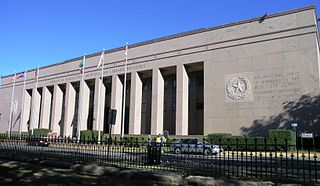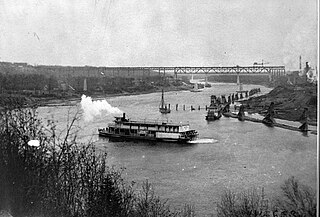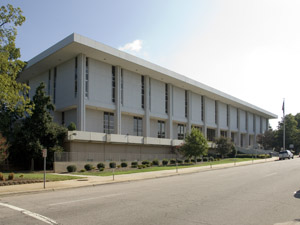Related Research Articles

In the United States, the presidential library system is a nationwide network of 16 libraries administered by the Office of Presidential Libraries, which is part of the National Archives and Records Administration (NARA). These are repositories for preserving and making available the papers, records, collections and other historical materials of every president of the United States since Herbert Hoover, the 31st president from 1929–1933. In addition to the library services, museum exhibitions concerning the presidency are displayed.

Library and Archives Canada is the federal institution, tasked with acquiring, preserving, and providing accessibility to the documentary heritage of Canada. The national archive and library is the 16th largest library in the world. The LAC reports to the Parliament of Canada through the Minister of Canadian Heritage.

The National Archives of Australia (NAA), formerly known as the Commonwealth Archives Office and Australian Archives, is an Australian Government agency that is the official repository for all federal government documents. It collects, preserves and provides public access to these documents, as well as other archival material related to Australia that the Archives judge ought to be preserved.

Trudy Huskamp Peterson is the first woman to hold the position of Archivist of the United States. She was the Acting Archivist of the United States from March 25, 1993 to May 29, 1995.

The following outline is provided as an overview of and topical guide to library and information science:
John Hall Archer, was a Canadian librarian, historian, and civil servant, and the first President of the University of Regina.

The Wisconsin Historical Society is simultaneously a state agency and a private membership organization whose purpose is to maintain, promote and spread knowledge relating to the history of North America, with an emphasis on the state of Wisconsin and the trans-Allegheny West. Founded in 1846 and chartered in 1853, it is the oldest historical society in the United States to receive continuous public funding. The society's headquarters are located in Madison, Wisconsin, on the campus of the University of Wisconsin–Madison.

The Texas State Library and Archives Commission (TSLAC) refers to the state government agency in the state of Texas that supports the reading, learning, and historical preservation needs of Texas and its people. The agency is charged with preserving the archival record of Texas, supporting research, and making primary resources available to the public; assisting public, academic, and school libraries across the state in meeting the needs of their communities and students; helping public agencies maintain their public records; and supporting the reading needs of thousands of Texans with disabilities preventing them from reading a standard book.
Oral history preservation is the field that deals with the care and upkeep of oral history materials, whatever format they may be in. Oral history is a method of historical documentation, using interviews with living survivors of the time being investigated. Oral history often touches on topics scarcely touched on by written documents, and by doing so, fills in the gaps of records that make up early historical documents.

The Dr. John Archer Library is the main library of the University of Regina in Regina, Saskatchewan, Canada. The library's purpose is to meet the teaching, learning and research needs of University of Regina students and faculty staff.
Ian E. Wilson is a former chief Librarian and Archivist of Canada. Appointed in 2004, he had previously been National Archivist of Canada. With Roch Carrier, the then National Librarian, he developed and led the process to link the National Archive and National Library as a unified institution. His distinguished career has included archival and information management, university teaching and government service. In addition, he has published extensively on history, archives, heritage, and information management and has lectured both nationally and abroad. Wilson retired as head of LAC in April 2009.
The Archives of Ontario are the archives for the province of Ontario, Canada. Founded in 1903 as the Bureau of Archives, the archives are now under the responsibility of the Ministry of Public and Business Service Delivery. The main offices of the archive are located at York University in Toronto.

David Sean Ferriero is an American librarian and library administrator, who served as the 10th Archivist of the United States. He previously served as the Director of the New York Public Library and as the University Librarian and Vice Provost for Library Affairs at Duke University. Prior to his Duke position, he worked for 31 years at the Massachusetts Institute of Technology library. Ferriero was the first librarian to serve as Archivist of the United States.

The Provincial Archives of Alberta is the official archives of the Canadian province of Alberta. It preserves and makes available for research both private and government records of all media related to Alberta. The Provincial Archives of Alberta also serves as the permanent archival repository of the Government of Alberta. The organization is situated in the Ministry of Arts, Culture and Status of Women.
The Queensland State Archives is the lead agency for public recordkeeping in Queensland, Australia. It is the custodian of the largest and most significant documentary heritage collection about Queensland.

Archives of Manitoba, formerly the Provincial Archives of Manitoba until 2003, is the official government archive of the Canadian province of Manitoba. It is located at 200 Vaughan Street in Winnipeg, where it has been established since January 1971.
The New York University Archives has served, since 1977, as the final repository for the historical records of New York University (NYU), in the Greenwich Village neighborhood of Manhattan in New York City, New York, U.S. The NYU Archives contains documents, photographs or drawings collected since 1854, including records or notebooks of some notable people. It functions primarily to document the history of the university and to provide source material for administrators, faculty, students, alumni, and other members of the university community. The NYU Archives also accommodates scholars, authors, and other interested persons who seek to evaluate the impact of the university's activities on the history of American social, cultural and intellectual development.
Nixon v. General Services Administration, 433 U.S 425 (1977), is a landmark court case concerning the principle of presidential privilege and whether the public is allowed to view a President's “confidential documents”. The Presidential Recordings and Materials Preservation Act, signed into law by President Gerald Ford in 1974, ordered that the Administrator of the General Services Administration obtain President Richard Nixon’s presidential papers and tape recordings. In addition, the Act further ordered that government archivists seize these materials. These archivists would preserve the material deemed historic and return to former President Nixon the materials deemed private. Furthermore, this Act stated that material that was preserved could be used in judicial hearings and proceedings. Immediately after this Act was enacted, Richard Nixon filed a lawsuit in a federal district court claiming that the Act violated the principle of separation of powers, the principle of presidential privilege, Nixon's personal privacy, his First Amendment right of association, and further asserted that it amounted to a constitutionally prohibited Bill of Attainder.

The State Archives of North Carolina, officially the North Carolina Division of Archives and Records, is a division of North Carolina state government responsible for collecting, preserving, and providing public access to historically significant archival materials relating to North Carolina, and responsible for providing guidance on the preservation and management of public government records to state, county, city and state university officials. First founded as the North Carolina Historical Commission in 1903, the State Archives has undergone multiple changes in organization, title, and relation to other state agencies. Since May 2012, it has been known as the Division of Archives and Records within the North Carolina Department of Natural & Cultural Resources' Office of Archives and History.
Arthur Silver Morton (1870–1945) was a Canadian historian, archivist, and academic.